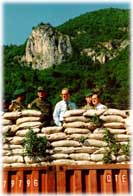

The Constitution of the Portuguese Republic attributes the function of Commander in Chief of the Armed Forces to the President of the Republic, and establishes his competencies for national defence.
The functions of the President of the Republic for national defence and as Commander in Chief of the Armed Forces are also defined in the Law for National Defence and the Armed Forces (Law No.29/82, of 11th December) .
[Image]
* To fulfil the functions of Commander in Chief of the Armed Forces;* To chair the Conselho Superior de Defesa Nacional;
* To declare war in the case of effective or imminent aggression, and make peace, at the proposal of the Government, with the advise of the Council of State and the authorisation of the Assembly of the Republic or its permanent committee, when it is not possible for it to meet immediately or for a meeting to be called;
* At the proposal of the government, to appoint and discharge the General Chief of Staff of the 3 sections of the Armed Forces, the General Chief of Staff of the Armed Forces being heard in the latter case.
* To declare a state of siege or state of emergency in the cases stipulated in the Constitution;
* To ratify international treaties, once they have been officially approved;
* Once war has been declared, to assume its highest command jointly with the Government.
RIGHTS AND OBLIGATIONS OF THE PRESIDENT OF THE REPUBLIC
AS COMMANDER IN CHIEF OF THE ARMED FORCES
(Law No.29/82, of 11th December)
The functions of the Commander in Chief of the Armed Forces, attributed inherently to the President of the Republic by the Constitution, include the following rights and obligations:
* The right to be informed by the Government about the situation in the Armed Forces and its staff;
* The obligation to privately advise the Government on national defence policy;
* The right to consult the Chiefs of Staff of the different sections of the Armed Forces;
* In case of war, the right to assume the high command, together with the government, and the obligation to contribute to maintaining of the spirit of defence and the readiness for combat of the Armed Forces;
* The right to award military medals on his own initiative;
* The right to hold the highest position in the Armed Forces.




